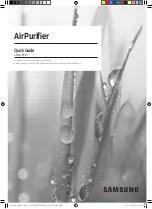
7
Installation Procedures
This manual cannot completely illustrate all the properties of the products you bought. Please
contact the local Airwell distribution center if you have any question or request.
Please use the standard tools according to the installation requirements.
The standard attached accessories of the units of this series refer to the packing list; prepare
other accessories according to the requirements of the local installation point of our company.
1.Choose the suitable installation location. Indoor units should be installed in places with
the environment of even circulation of cool and warm blows. The following places should
be avoided.
Places with high salinity (beach), high sulfureted gas(such as the thermal spring regions where
copper tubes and soft soldering are easy to be eroded), much oil(including mechanical oil) and
steam; places where organic substance solvent is frequently used; places where machines
generate the high frequency electromagnetic wave (abnormal condition will appear in the control
system); places where there is high humidity exists near the door or windows (dew is easily
formed); and places where the special sprayer is frequently used.
3.Dimension (unit: mm).
Model
a
b
c
d
e
f
g
h
i
DDV007~016
420
892
370
850
185
640
90
760
152
Indoor Units
1. The distance between wind outlet port and the ground should not be more than 2.7m.
2. Select appropriate places for installation where the outlet air can be spread to places all over
the house and arrange proper locations for connecting pipes and lines as well as the drainpipe
to the outdoor.
3. Ceiling construction must be hard enough to hold the weight of the unit.
4. Make sure that the connecting pipe, the drainpipe and connecting guide line can be put into
walls to connect the outdoor units.
5. It is recommended to make the connecting pipe between the outdoor and indoor units and the
drainpipe are as short as possible.
6. Please read the attached installation instruction of outdoor units for regulation of filling amount
of refrigerant if necessary.
7. The connecting flange should be checked by users.
8. Those electrical appliances such as television, instruments, devices, artwork, piano, wireless
equipment and other valuables should not be placed under the indoor unit as to prevent
condensate from dropping into them and causing damage.
2.The following steps can be taken after selecting the installation place:
(1) Cut a hole in the wall and insert connection pipe and connecting wires
through a locally purchased PVC pipe. The hole should be inclined slightly
downward with an inclination of at least 1/100 (see Figure 1).
(2) Before cutting the hole, ensure no pipe or rebar is placed behind the cutting
position. Avoid cutting a hole at the place of wires or connection pipes.
(3) Hang the unit on a horizontal and firm roof. If the unit base is not stable, it may cause noise,
vibration or leakage.
(4) Support the unit firmly and change the shapes of connection pipe, connecting wires and
drain pipe to make them easily get through the hole.
Summary of Contents for AWSI-DDV007-N11
Page 3: ...1 Parts and Functions ...
Page 21: ......
Page 22: ......
Page 23: ......
Page 24: ......










































